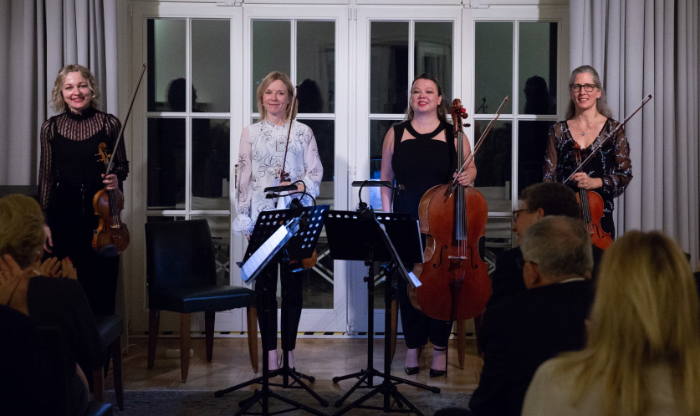The Clarion Quartet, consisting entirely of members of the Pittsburgh Symphony Orchestra (PSO), had the honor of playing at the American Academy in Berlin on the orchestra’s recent European tour. Joining us was our music director, Manfred Honeck, and members of our board and management. The special concert, with the theme “Peace, Culture, and Remembrance”, was scheduled on the orchestra’s first day off, between PSO concerts in Hamburg and Hannover, and coincidentally fell on the day of the anniversary of the shootings at the Tree of Life synagogue in Pittsburgh. (Note: see “Pittsburgh Symphony Responds” in the December 2018 issue, and “Where Words Fail” in the March 2019 issue.)

The Clarion Quartet (l to r): Marta Krechkovsky, Jennifer Orchard, Bronwyn Banerdt, and the author
Photo credit: Annette Hornischer
In our mission as a quartet, we play the music of great composers whose lives were marked by political suppression and control, as a means for us to shine light on their subsequently neglected work. It has given us true purpose in our music making, a chance to do something about the enormity of this cultural and human injustice.
Interestingly, the last time our quartet deviated from a tour schedule to play a special concert was for a trip to the well-known former concentration camp of Theresienstadt, now a memorial. There we had played Viktor Ullmann’s Third Quartet, which he wrote at the camp, on the original Magdeburg barrack stage where the famous children’s opera Brundibár was performed. This was three years prior, in the early months after the founding of our quartet. We played the same quartet in Berlin to open the program, as we remembered souls lost just a year before in one of the world’s most violent attack against Jews since the Holocaust.
After the Ullmann, we played two pieces by exiled Polish composer, Miecyzlaw Weinberg, and finished with Dimitri Shostakovich’s Seventh Quartet.
Next came a discussion panel, mediated knowledgeably by Academy alumnus Harry Liebersohn, with Manfred Honeck and Pittsburgh writer, Adam Ehrlich Sachs. After words of remembrance, the conversation focused on the role of music in peace making, healing, and as a political tool. This discussion I found very interesting and wished to have been able to continue, as the minds gathered in that room were part of the intellectual and cultural community fostered by the Academy. We could have spoken on these topics and delved into their importance for hours longer.
The main sentiment that has stayed with me is that music has always been the most powerful communicator, as it speaks without need for translation, directly to the heart, and has been the greatest healer of human hearts in times of tragedy, has the ability to lift sunken spirits, and to create a space to feel. It is our responsibility as musicians to further the work of those who had the courage and fortitude to create music and beauty under the worst of circumstances.
I’m honored to be a member of this quartet, to have been able to represent the Pittsburgh Symphony at this event, and to have the support of our orchestra and management as we go forward, hoping to inspire more musicians to take on this important work.
Note: the author is Acting Principal Viola of the Pittsburgh Symphony Orchestra.





